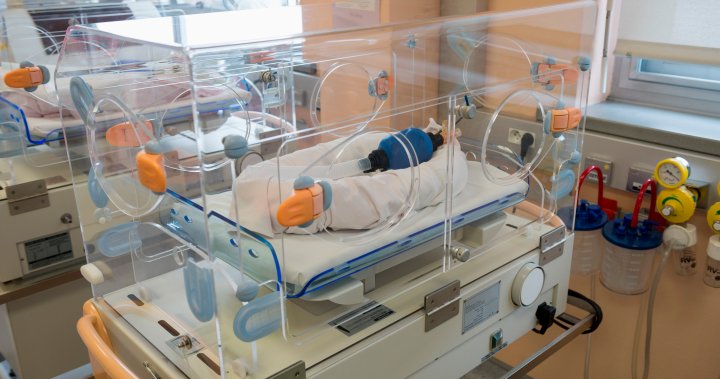The U.S. Food and Drug Administration (FDA) is cautioning hospitals against the use of probiotics for preterm infants following the death of a baby who was administered the supplement.
In a warning letter published on Sept. 29, the FDA said preterm infants who are given probiotics are at risk of an invasive, potentially fatal disease caused by the bacteria or fungi contained in probiotics.
While preterm infants in Canadian hospitals are also administered probiotics, there has been no similar warning issued in Canada.
Global News reached out to Health Canada for comment about the use of probiotics on preterm infants but did not hear back by the time of publication.
In a 2022 position statement, the Canadian Paediatric Society said although probiotics are generally considered safe to use in infants, there have been cases of premature babies developing sepsis when using the product.
“The effect of probiotics on the developing immune system is being investigated, with their long-term effects still not fully known,” the statement read.
Probiotics are live microorganisms, such as bacteria or yeast, and are often taken for health benefits in the form of capsules or liquid drops.
In Canada, they are considered natural health products and are regulated along similar lines as vitamins, minerals and herbal remedies.

They are given to premature infants to prevent necrotizing enterocolitis (NEC), a condition that causes inflammation in the gastrointestinal tract, leading to severe complications or even death, explained Dr. Belal Alshaikh, a neonatologist at Alberta Health Services.
While acknowledging the associated risks, he emphasized that administering probiotics to premature infants has life-saving potential.
“When we use a probiotic, we always look at how many lives we saved with the probiotic,” he said. “You can save anywhere between 100 to 150 lives with the probiotic versus one case that could cause infection from the probiotic strain in the product that causes death or harm for the babies.”
Probiotics are approved for preterm babies in Canada
The FDA has not approved any probiotic product for use as a drug or biological product in infants.
“The FDA concern is largely about the regulation of the probiotic in the U.S., because, unlike other drugs and supplements in the U.S., the probiotics are not well regulated there. So that’s what caused some problems for the country,” Alshaikh said.
“In Canada, we have products here that have like a Health Canada approval as a supplement actually to be used in preterm infants,” he said, adding he would only use the probiotics approved by the federal regulator.
What prompted the FDA warning?
In the FDA’s warning letter, it said a preterm infant with a birth weight of under 2.2 pounds was administered a probiotic, Evivo with MCT Oil, as part of in-hospital care. As a result of this, the baby developed sepsis caused by the bacterium Bifidobacterium longum and subsequently died, the FDA said.
“Genomic sequencing data demonstrate the bacterium that caused sepsis in this infant was a genetic match to the bacteria contained in this probiotic,” the FDA stated, adding it is investigating the death.
The regulator did not disclose the date or name of the hospital.
Evivo with MCT Oil, a probiotic manufactured by California-based Infinant Health, told Global News in an email Friday that it has agreed to voluntarily recall its product. The product is not available in Canada.
“That product was used by health-care professionals in hospital settings, including neonatal care for preterm infants. FDA recently issued a warning letter objecting to the use of Evivo with MCT Oil and all other probiotics in preterm infants. We have notified medical practitioners and hospitals of our recall and the FDA warning letter,” a spokesperson for the company said.
Sepsis is a life-threatening condition that occurs when the body’s response to an infection injures its own tissues and organs, according to the Canadian Sepsis Foundation. It can lead to organ dysfunction and failure, shock and death if not promptly treated.

In terms of sepsis and probiotic risk, it can happen when microorganisms get into the blood and cause infection in the infant’s body, Alshaikh said.
“But we always need to balance this, because probiotics itself, there is evidence that probiotics decrease sepsis in babies because it prevents bad bacteria from causing infection in preterm infants,” he said.
There have been previous reports of microorganisms found in probiotics linked to illness or death in preterm babies, but cases have been very rare, according to a 2021 study published in Pediatrics by the American Academy of Pediatrics.
“There have been a few cases of probiotic-associated sepsis reported in neonates receiving Lactobacillus rhamnosus (in a probiotic),” the researchers stated. “Although the risk appears to be low, the potential of bacterial cross-colonization among infants within a unit is also a potential risk.”
Where Canada stands on preterm infants and probiotics
In its position statement, the Canadian Pediatric Society said although the literature on the subject is conflicting, “present evidence suggests” probiotics can decrease mortality and lower the incidence of NEC in preterm and low birth weight babies.
“Probiotics may also be beneficial in reducing feeding intolerance. In infants, probiotics may be considered to reduce symptoms of colic,” it added.
However, the statement added there are risks associated with probiotics.
For example, it said there have been multiple cases of sepsis associated with bacteria in probiotics (Saccharomyces and Lactobacilli species) in susceptible children, particularly those who are immunocompromised or are born prematurely.

“We use a probiotic for preterm infants when they don’t have the balance between good and bad bacteria in their gut,” Alshaikh said.
“Because all of them are in the hospital and in the neonatal intensive care unit, they acquire a lot of bad bacteria from the environment they are in. So when we give them probiotics, we try to restore the balance between the friendly or good bacteria and the bad bacteria. We prevent them from getting into infection.”
A 2022 study published in Cell Host & Microbe, on which Alshaikh is the lead author, found that probiotic supplements containing the right type of microbes can help form a healthy microbiome for infants who are born without a fully formed gut microbiome.
The infants studied in this randomized clinical trial were born at less than 29 weeks gestation and weighed less than 2.2 pounds at birth.




